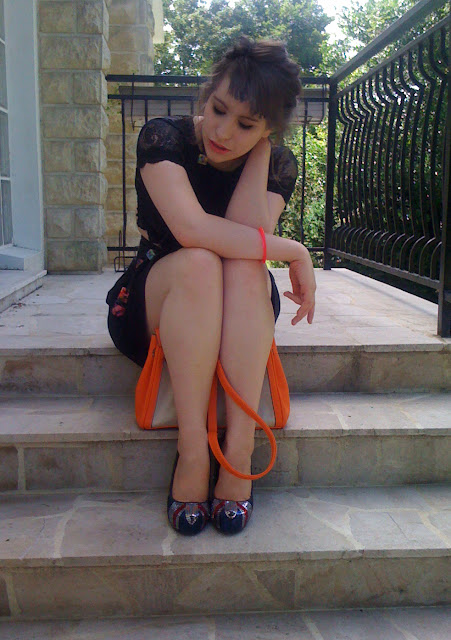Is Fashion self-destructive? Oddly enough, it is a phrase that has never much been used much in conjunction with Style and Creation, but is arguably fitting. Anything else which completely broke itself down to its core every season, or every couple of seasons, for no apparent straight-forward reason would be considered unhealthy and non-viable for good business. In any other field, when something works, you push it until sales stop dwindling to a economically unsure level. Somehow, fashion is a bubble which has missed out on this area of good business in a most spectacular way for, in Fashion, if you don't re-create yourself constantly, you don't sell.
In some ways, it is an anomaly.
It isn't so much the fact that the Chanel Resort 2012 plastic shoes made even the most experienced model's feet bleed, that Sisley scrawled 'Fashion Junkie' (In other words, fashion victim) across their clothing adverts or that openly provocative practises are linked with fashion in self-made adverts.
Fashion has a funny way of embracing those who actively, whether ironically or not, seek to destroy it. It is a sort of dark glamour that the fashion crowd keep begging for - Punk and anti-fashion taken to the forefront. Take, for example, Moschino. His designs were very innovative and unusual, parroting things such as a quilted black denim miniskirt with plastic fried eggs decorating the hemline, quilted jacket decorated with bottle tops, plug-socket drop earrings, and bodices made out of safety pins. He was dubbed the Jean-Paul Gaultier of Italian fashion but their styles are different; while Gaultier experiments with different fabrics and shapes, Moschino used basic forms and traditional methods.
What makes his rise to prominence in Fashion interesting is his apparent disregard for it. He spoofed high fashion lines through his clothes. For example, "Expensive Jacket" was embroidered in gold across the back of a cashmere jacket, and "Bull Chic" on a matador-styled outfit. He also mocked the fashion classics such as the Chanel jacket with garish trimmings and details. Ironically, many rushed to wear his clothes, thus becoming successful and famous in the industry he satirized.
On the other hand, it's possible that, quite the opposite, IT IS JUST IRONY. Let's not forget that Moschino was made rich on the back of fashion. Let's not forget either that disturbing or even counter-productive advertising (Shockvertising) is a very effective way of selling clothing. After all, United Colours of Benetton is famous for it and Sisley is rather prone to using it too. If Jean Paul Gaultier made him name as an 'enfant terrible', it was not by sitting around, calmly accepting fashion. It was by getting up, wanting to change it and, yes, maybe throwing in a few inflammatory and paradoxical phrases on the subject of fashion now and then.
If Moschino campaigned to "Stop the Fashion System." Vivienne Westwood promoted Punk, essentially anti-fashion. How strange that these should both become recognised and beloved brands!

PUNK?
"A style or movement characterized by the adoption of aggressively unconventional and often bizarre or shocking clothing, hairstyles, makeup, etc., and the defiance of social norms of behaviour, usually associated with punk rock musicians and fans."
FASHION?
"Conventional usage in dress, manners, etc., especially of polite society, or conformity to it: the dictates of fashion; to be out of fashion."
 PARADOX? You'd think so... What if Fashion adopts that which seeks to destroy it as a means of neutralising it, and any danger it may cause the system? If that be the case, I must apologise to Punk because Fashion would then have won one over it. Punk has been assimilated and turned into another branch of high end and high street fashion. Trying to destroy fashion has been turned into a part of fashion... and if any more proof of this is needed, take the way that at the London 2012 Olympics closing ceremony, a tribute to British Fashion involving Kate Moss and Naomi Campbell was paired with David Bowie's song 'Fashion', which is far from reverential on the subject of 'La Mode'. Take a listen if you don't remember.
"It's loud and tasteless
PARADOX? You'd think so... What if Fashion adopts that which seeks to destroy it as a means of neutralising it, and any danger it may cause the system? If that be the case, I must apologise to Punk because Fashion would then have won one over it. Punk has been assimilated and turned into another branch of high end and high street fashion. Trying to destroy fashion has been turned into a part of fashion... and if any more proof of this is needed, take the way that at the London 2012 Olympics closing ceremony, a tribute to British Fashion involving Kate Moss and Naomi Campbell was paired with David Bowie's song 'Fashion', which is far from reverential on the subject of 'La Mode'. Take a listen if you don't remember.
"It's loud and tasteless
And I've heard it before."
(Or was it the other way around? Did Punk win by forcing its way into the mainstream and thus changing it? Ideas, anyone?)
THANK YOU FOR READING! IF YOU ENJOYED, WHY NOT FOLLOW? ;)
Oh, and I know there are many other areas of this subject which I could have explored and didn't when constructing a conclusive argument. However, there are too many of them right now. I might re-do this argument from a different perspective on a future post.














